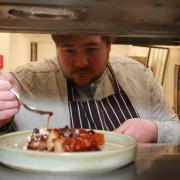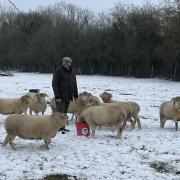Peter Seddon turns detective in search of Matthew Walker

It’s that time again when the staples of the Christmas table tempt us once more. Diets go out of the window. Tradition demands it – and we need those extra reserves to counter the winter chill. Of all the seasonal fare the Christmas pudding remains as popular as ever. Alongside ‘turkey and all the trimmings’ the classic ‘pud’ embodies that old-fashioned Christmas spirit that we continue to savour.
Derbyshire has a special stake in this time-honoured ritual. It is said that 40 per cent of all Christmas puddings consumed worldwide, and two-thirds eaten in Britain, will be made by Heanor-based firm Matthew Walker – the oldest Christmas pudding maker in the world. Each year they sell around 25 million in an imaginative range catering to all tastes – but every one based on the classic original recipe used by founder Matthew Walker over a century ago. The majority are eaten on a single day – Christmas Day.
The company’s story has been told many times – but few details of Matthew Walker himself have ever emerged. The standard pen-picture labels him ‘a humble Derbyshire farmer’s son’ who started the company in 1899 ‘making plum puddings to his mother’s recipe’. But there it ends. Time for a vintage Christmas special – ‘Matthew Walker – This Is Your Life.’
Since this is a ‘Monumental Musings’ feature we start our search in the tranquil churchyard of St Helen’s in Darley Dale, tucked quietly below the busy A6 close to Matlock. In the shade of an ancient yew tree (itself a distinguished monument – more of which another time) are seven stone tablets each carved with the name of an allied action in the Second World War. The largest reads: ‘The Battle of Britain – September 1940’.

Since dubbed ‘Milestones to Victory’ these modest but hugely redolent monuments were the gift of Darley Dale parishioner Matthew Walker – the very same ‘pudding king’ – who from 1926 until his death in 1944 lived at handsome Abbey House near St Helen’s Church where he worshipped and was buried.
They encapsulate Walker’s forward-thinking character – for he erected the ‘Victory Stones’ prior to the war’s end. Indeed he died before the final Allied Victory. But his patriotic heart had willed the outcome – and he was right.
Perhaps that unshaken belief that ‘right would prevail’ stood him in good stead as a businessman. Whatever his credentials the ‘farmer’s son’ certainly did well – when he died at Abbey House aged 74 in 1944 he left the then considerable fortune of almost £40,000.
Matthew Walwyn Walker was born in 1869 at Stockley Park Farm in Anslow, Staffordshire, near Tutbury. He was the third of six children of tenant farmer Matthew Walker senior, born at Ellastone near Ashbourne, and his wife Sarah Hewitt, a native of Thurvaston, said to be the originator of Matthew’s recipes.

Walker senior was rather more than the ‘humble farmer’ of established wisdom. His dairy and sheep farm at Anslow was a substantial concern, and Walker a prominent figure in farming circles who won countless prizes for his livestock and produce countrywide. His cheeses were said to be particularly fine – and he was an eminent pig-breeder of national renown.
That surely had a bearing on his son’s outlook, for it suggests that Walker senior pursued excellence in all he did – presenting the best natural products in the best possible way.
He also gained a reputation as a most efficient farmer and champion of tenant rights. This led to a significant move, for after rumblings with his landlord he sold off much of his Anslow stock and in 1876 relocated to a farm in Chaddesden village as one of the chief tenants of Sir Henry Wilmot VC of Chaddesden Hall.
Young Matthew was then only six, so spent key years as a Derbyshire boy. That’s breaking news – the ‘Pudding King’ was a Chad-Lad. But that idyllic rural childhood was soon tarnished. In 1880 at the age of just 42 his father died ‘after several weeks of serious illness’. Matthew was then ten – and his father’s passing prompted both an end and a new beginning.
Obituaries observed that Walker was ‘admired and respected’ by all who knew him in farming circles, and he ‘undertook a great deal of splendid work in the Derbyshire Agricultural Society’. By all accounts a fine role model to his son.
Soon after Walker’s death the farm stock was substantially sold and Matthew’s mother Sarah went to live with her widowed mother in Quarndon, taking four of her children with her. But Matthew stayed behind in Chaddesden – recorded on the 1881 Census as a ‘pupil’ at Farm House, evidently learning the ropes.
But farming wasn’t his ultimate destiny. Instead, with a weight of responsibility on his very young shoulders, Matthew Walker took his first steps into the retail and manufacturing world.
In the 1880s while still in his teens he gained employment as a live-in assistant at Hodgkinson’s Grocery in Derby Market Place. Drawing on his farming background he began supplying the shop with his own products – initially fresh fruit, jams, and country-style wines – which Hodgkinsons sold well. As a result he later went into partnership with Thomas Hodgkinson styled M. Walker & Co. That was in 1899 – the adopted foundation date for the Matthew Walker brand.
He was then 29 but not yet fully independent. Indeed the 1901 Census still recorded him as ‘grocery assistant – worker’. But in 1904 the partnership with Thomas Hodgkinson was dissolved – Walker went solo.
This was a pivotal moment for Matthew Walker – and by then his personal circumstances had also changed. On 22nd September 1900 he had married Kate Lowndes, daughter of John Lowndes of Hall Farm, Kirk Langley. The couple settled at 226 Uttoxeter New Road, Derby, where in 1906 their son John Walwyn Walker was born – destined to run the business after his father’s death.
The first decade of the 20th century proved a key time for Matthew Walker – from premises in Exeter Street he expanded the business and never looked back. He continued to style himself ‘fruit preserver’ and ‘jam manufacturer’ – indeed the Derby premises were always ‘the jam factory’. But diversification proved a master stroke – when Walker put his preserved fruit into ‘plum puddings’ he was soon ‘pulling out the silver sixpence’ every year.
He made sufficient money to move to Abbey House in Darley Dale in the 1920s – the estate included Abbey Farm which he let to tenants. The tables thus turned, Matthew Walker had become the landed gentleman of means.
But like many entrepreneurs emerging from the Victorian age he had an admirable social conscience and was noted for his charitable acts. Each year he supplied all the puddings – feeding 2,800 in 1914 – for the Robin Christmas Dinner given to the poor children of Derby. In Darley Dale he created a recreation ground and gave land for a cemetery.
Transcripts of talks he gave to the Matlock Rotary Club also reveal further facets of Walker’s personality – deeply patriotic, fiercely proud of the British military and a staunch defender of the mutual benefits of the British Empire. His speeches brimmed with patriotic fervour – Walker was particularly proud that ingredients for his products came from across the colonies. Indeed the plum puddings in their white porcelain basins were labelled ‘All Empire Fruit’.
A few dissenting voices today might baulk at that – but throughout and beyond Matthew Walker’s life this resonated well with the wider public. The traditional British Christmas pudding assumed a cherished status – described in the press in 1927 as ‘a symbol of unity throughout the British Empire’. The ‘British pudding’ became a seasonal must-have both at home and abroad – and sales to servicemen and colonists helped Walker’s exports to grow considerably.
Even so the figures were a fraction of today’s 25 million annual sales. The year he died Walkers produced just 125,000. But that was enough to establish Matthew Walker’s legacy as the ‘Pudding King’ – yet his roots were never forgotten. Following his death on 11th July 1944 he was still labelled ‘the well-known jam manufacturer’.
The company was continued by his son John Walwyn Walker (1906-1986). The Derby ‘jam factory’ remained its headquarters until 1967 when John sold the business and it relocated to new purpose-built premises in Heanor.
It is now owned by a large conglomerate but still retains the sense of tradition that Matthew Walker instilled from its small beginnings. And just as importantly it retains his name – the son of a Derbyshire farmer lives on.
It is a stirring story (no pun intended) of a young boy who began modestly, suffered a blow, learnt his craft, stuck to his principles of hard work and made his lasting mark on the world’s Christmas tables.
So when it comes to the big question ‘who’s got room for pudding?’ there is only one valid reply. In fact – in the interests of supporting Derbyshire enterprise – it would be rude not to have seconds. May your Christmas be a full one…



























